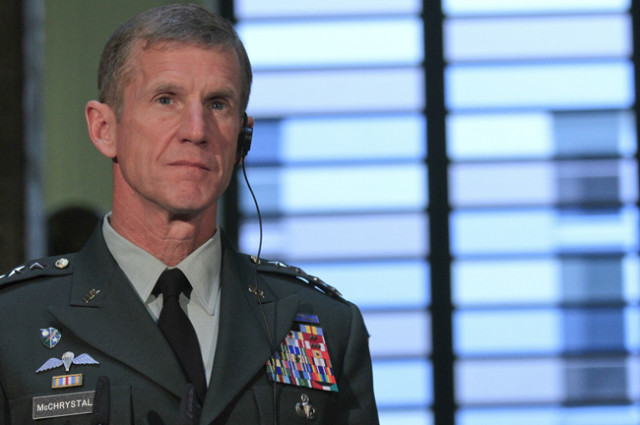The ease with which General Stanley McChrystal was sacked should not allow us to shrug off the implications of his rebellion. McChrystal’s criticism of US civilian leadership is another cost of the Afghan war that America has to face- a clash between the military and the executive.
Unfortunately, a clash between these institutions is inevitable in the face of a security threat that has few tangible solutions. As commander of US forces in Afghanistan McChrystal undoubtedly understood the conflict’s ground realities better than civilian leaders. But the resources needed to wage the war McChrystal-style were not at his disposal. The tools the general needed had to be approved through slow bureaucratic procedures that a military man had little patience with. McChrystal was dissatisfied, and his contempt for the lazy civvies in the White House grew and grew, until it spilled over.
The scenario above could be describing Pakistan, where the military’s disdain for politicians is an open secret. This disdain is fuelled by both the government’s inefficiency and the military’s monopoly on the management of external and internal threats. Given Pakistan’s obsession with the ‘Indian threat’ and our long-term affair with Afghanistan, it’s easy to see why the military is an omniscient presence.
Consequently, in addition to strengthening our civilian leadership, we need to distance ourselves from imagined threats. As the threat of conventional war decreases the military should be scaled back, and internal security and counter-insurgency operations must be placed firmly in the government’s hands. India serves as an example to us in this regard. It has not used the military against the Maoists despite the threat the ‘insurgency’ poses. In India, the army is where it’s meant to be: at the border, and in the barracks.
The US, too, has put the army in its place for now. As Obama rightly said, institutions should be greater than individuals. However, the threat that insecurity and war pose to democracy cannot be dismissed either. Weak institutions are weakened further by instability, which is why Pakistan needs to turn its eye inwards. After all — all’s fair in war.
Published in The Express Tribune, June 29th, 2010.



COMMENTS
Comments are moderated and generally will be posted if they are on-topic and not abusive.
For more information, please see our Comments FAQ